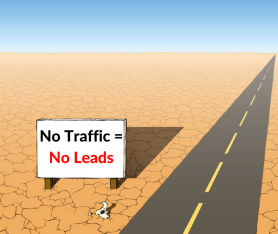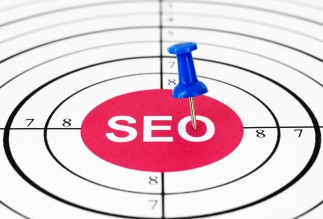Looking For More Traffic To Your Website?

A lot of small business websites are like billboards in the desert. They are attractive and flashy but with no passing traffic they don’t generate new customers or sales.
The business and marketing landscape has changed and the 2018 Telstra Small Business Intelligence Report suggests that 47% of customers under the age of 40 use a search engine to find or research a small business at least once a day. As such, the first touch point with a prospective new customer, client or patient is probably going to be your website. Even people referred to you will check out your website before they call.
An amateurish website makes a bad first impression and could be costing you sales. if your website is an ‘electronic brochure’ that simply lists the who, what and where of the business then it’s time for an upgrade, makeover or replacement. Traditional marketing methods like print, radio and television have lost their marketing mojo and are being replaced by online marketing tactics including Google searches, content marketing, email marketing and social media. Your website is your primary marketing engine so let’s look at how to drive more traffic to your website.
SEARCH ENGINE OPTIMISATION (SEO)

SEO is the process of improving your website’s page rankings on Google and the other search engines. Google search results are determined by an algorithm or computerised set of formulas and they constantly change. Search engine optimisation describes a series of techniques you can use to improve the relevance and ranking of your website pages. The end goal is to get your website to appear on the first page of the search results for your primary keywords or phrases because statistically, most people don’t look beyond those results. SEO relies heavily on your content and keywords.
❶ Content Marketing
I’m sure you’re familiar with the expression, content is king. From an SEO point of view, your content is critical because Google wants to give its users the most accurate and relevant search results. Your content is the primary material that Google uses to produce their results. The good news is, Google provides a level playing field so if your content is original, fresh and relevant to the search phrase, you can outrank your larger competitors.
Of course, your fresh, new content can position you as an expert in your field and also integrate with other marketing channels like your social media to increase exposure and engagement with your target markets. The ultimate outcome is to create more leads, increase conversions and generate more customers. If you are creating your own content it will only cost your time and don’t forget, your content is more than just a web page and includes video, blogs, newsletters, e-books, checklists and templates.
❷ Social Media
Facebook is a very powerful marketing tool that provides two distinct marketing options - organic content and paid ads.
Organic content is the content you post on your business’ Facebook page and there is no cost associated with this option. You simply need a Facebook account and the objective is to post relevant content that engages with your target market and build a relationship with your community of followers. Organic social media posts serve to position you as an expert in your field, a thought leader in your industry plus provide a touch point with your customers or clients to keep you in their thoughts.
Social media is an effective way to distribute your valuable content and can spread organically across your entire network and beyond if people share your content with their network. It’s a compounding effect but if your organic content isn't delivering the results you want you can look to paid advertising methods to boost the results.

Facebook advertising is a whole new world that lets you create a marketing campaign that targets your ideal type of customer or client. Facebook provides a variety of ad types that are designed to attract more traffic to your website, win more sales or get more social engagement. Facebook advertising also lets you re-target your previous customers to increase retention and improve your sales.
PPC advertising or Search Engine Marketing (SEM) is another paid form of social media advertising. Also known as Google AdWords, this
strategy lets you target your ideal type of customer and offers different types of ads. With PPC, you only pay for the number of clicks
your advertisement receives and where businesses compete for the same or similar ad words, Google operates on an auction-style pricing
model. It can be very effective because you are reaching people who are actively looking for your products or services, but we have also
seen plenty of business owners burn lots of money with Google AdWords.
This article forms part of our June 2018 Business Accelerator Magazine. Click HERE to download the full edition or browse other articles in this edition below:
Other Articles in this Edition:
-
Federal Budget 2018/19 Summary
-
Changes for Individuals (3 Stage Personal Income Tax Plan, Preventing
Bracket Creep, Removal of 37% Bracket, Medicare Levy Rates, Taxation of High Profile Individuals)
Other Tax Changes (Deny Deductions for Vacant Land)
- Business Summary (Extension of $20,000 Instant Write-Off, Introduction of Cash Payment Limit, Expansion of Taxable Payments Reporting, Removal of Tax Deductibility for PAYG Payments Where Criteria isn't Met)
- Companies Summary (Phoenix Activity, Division 7A Changes, Research & Development Incentive)
- Trusts ( Children's Income & Testamentary Trusts, Circular Family Trust Distributions)
- Partnerships (Partners Accessing CGT Concessions)
- Superannuation (SMSF 3 year Audit Cycle, Maximum Number of Members, Voluntary Contributions Work Test Exemption, Concessional Cap Breaches, Deductions for Personal Contributions, Passive Fees - Banning Exit Fees - Small Accounts, Life Insurance)
- Other Tax Changes (Deny Deductions for Vacant Land)
-
Changes for Individuals (3 Stage Personal Income Tax Plan, Preventing
Bracket Creep, Removal of 37% Bracket, Medicare Levy Rates, Taxation of High Profile Individuals)
Other Tax Changes (Deny Deductions for Vacant Land)
IMPORTANT DISCLAIMER: This article contains general advice only and is prepared without taking into account your particular objectives, financial circumstances and needs. The information provided is not a substitute for legal, tax and financial product advice. Before making any decision based on this information, you should speak to a licensed financial advisor who should assess its relevance to your individual circumstances. While the firm believes the information is accurate, no warranty is given as to its accuracy and persons who rely on this information do so at their own risk. The information provided in this article is not considered financial product advice for the purposes of the Corporations Act 2001.













